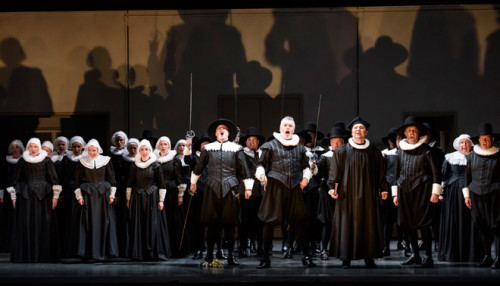
 United Kingdom Bellini. I Puritani: Soloists, Chorus and Orchestra of Welsh National Opera/Carlo Rizzi, Venue Cymru (North Wales Theatre), Llandudno. 27.10.2015. (RJF)
United Kingdom Bellini. I Puritani: Soloists, Chorus and Orchestra of Welsh National Opera/Carlo Rizzi, Venue Cymru (North Wales Theatre), Llandudno. 27.10.2015. (RJF)
Bellini, I Puritani (1835)
Cast:
Elvira: Linda Richardson
Arturo: Alessandro Luciano
Riccardo Forth: David Kempster
Gualtiero Valton: Aidan Smith
Bruno Robertson: Peter Van Hulle
Giorgio Valton: Wotjek Gierlach
Enrichetta: Sian Menhir
Actress: Elena Thomas
Production:
Director: Annilese Miskimmon
Designer: Leslie Travers
Lighting Designer: Mark Jonathan
Chorus Master: Alexander Martin
Conductor: Carlo Rizzi
Welsh National Opera have what might be termed form in respect of I Puritani. In 1982, in order to showcase the vocal and histrionic skills of their star soprano at the time, Suzanne Murphy, they hit upon the idea of staging Bellini’s tenth opera I Puritani. It was then, as now, only presented by a company that believes it has singers to match those for whom the opera was originally written, particularly the soprano Giulia Grisi and the tenor Rubini. It had not been seen in Britain for over twenty years and in Wales for even longer (Welsh National Opera. Richard Fawkes, 1986).
Produced by Andrei Serban the 1982 production was a great success, the staging and being used in productions by Opera North in 1986, with Suzanne Murphy reprising the role of Elvira, and was the highlight of the Covent Garden season in 1992 with a star studied cast which included June Anderson, Robert Lloyd, Giuseppe Sabbatini and Dimitri Hvorostovsky. In 2001 it was seen at the Gran Theatre del Liceu, Barcelona, to celebrate Bellini’s centenary and where it was filmed with Edita Gruberova as Elvira (DVD TDK DV OPIP). In a relatively simple set Serban’s production had the virtues of simplicity and clarity whilst keeping the drama moving within the composer’s vision.
However, that production originated in the seemingly far off days when producers respected the composer’s intentions rather than, as here, their own concept. The outcome for this latest production by Annilese Miskimmon is typical of the modern genre being a mish mash of ill-conceived ideas and costumes and with an ending contrary to Bellini’s intentions and music.
It opens in recent Northern Ireland during the so-called troubles with Protestant marchers complete with their bowler hats and white gloves arriving at the local church hall. Part way through Act One all is changed to period costume with the exception of an extraneous actress in modern dress – of which more anon. Act Three sees a return to modern dress with the cavalier Arturo, previously seen in smart period costume returning in scruff mufti to declare his love to the deranged Elvira. At the end there is no pardon from Cromwell, and Arturo merely has his throat cut as the emissary passes by with the pardon, whilst Elvira is left in a mentally mad state!
If the audience had had the benefit of the promised titles they might, with a bit of luck and imagination, have made sense of what it was all about, the production being no help at all. However after a stuttering start the titles pegged out altogether after ten minutes or so leaving many in the audience vainly trying to catch up with what was going on via the inadequate programme notes that encompassed the whole of act two in four lines of text! I was still giving explanation to the frustrated hardy souls who turned up for Orlando the following night!
Given the above debacles it was down to the music and singers to save the day. Given Murphy’s Law of bad luck, no relation to the Welsh soprano of 1982, it was a good job that the Irishman had taken a day or so off. The scheduled tenor, Barry Banks, one of the few native Britain’s capable of singing Arturo with its high laying tessitura had withdrawn due to hospitalization and the much admired soprano of the first run had been changed by a scheduled replacement. It could all have collapsed into a debacle of an evening. The fact that it did not do so was due to the musical performance of the orchestra under that master of Italian opera Carlo Rizzi, the sonorous choir and the quality of the soloists, not least the replacements. The tenor Alessandro Luciano as Arturo, managed the high Cs and the fiendish D in act three well enough, managing the florid demands of the music just as he did as Rodrigo in Rossini’s Otello at the Buxton Festival in summer 2014 (see review). His singing also brought a welcome touch of Italianata to the vocal proceedings, his phrasing and general musicality was much appreciated.
As Elvira, the focus of two long mad scenes made famous in the middle years of the last century by the redoubtable Maria Callas, was sung by the lyric soprano Linda Richardson, whom I have admired over many years and who was outstanding in both her sung and acted interpretation. In her period gown she looked the part and acted it to near perfection. In no way did she need the incongruously modern skirted actress cavorting around the stage to somehow indicate Elvira’s demented state. What a waste of a salary! Perhaps that is where the theme of the season, madness, came in?
Robert J Farr
